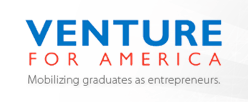It’s no secret that there are a relatively small number of regions that most startups call home — namely Silicon Valley and, increasingly, NYC. And talented recent college grads (even those that don’t pursue a career involving startups) are also drawn to just a handful of regions that have high concentrations of professional services, like consulting and law firms.
Which leads to a problem: some of the cities that would stand to benefit most from these talented individuals — like Detroit, New Orleans, and Providence — simply aren’t getting their fair share.
Now a new non-profit called Venture of America is setting out to change that. The goal is simple: bring more jobs to cities that need them by sending talented recent college graduates to startups in those areas. The startups get access to low-cost talent, and the program participants, called Fellows, are guaranteed a two-year position where they stand to learn a great deal, and get their foot in the door to the startup community. And, hopefully, the startup grows and creates even more jobs.
The program already has support from some top names in the startup community: participating investors include David Lee (SV Angel), Chip Hazard (Flybridge), Lawrence Lenihan (FirstMark), Josh Linkner (Detroit Venture Partners), Andrew Parker (Spark Capital), Andy Sack (Techstars & Founder’s Co-Op), Medha Vedaprakash (Rho Ventures), Chris Paik (Thrive Capital) and Andrew Weissman (Betaworks cofounder). There are also a half dozen ‘regional development partners’ who are pledging to hire incoming Fellows. And Brown University has agreed to be the site of the organization’s startup bootcamp. (You can find a full list of the team right here).
Founder and President Andrew Yang says that the program was inspired, in part, by Teach for America, which places recent college grads as teachers in areas in that need them. Of course, there are some major differences between the two organizations. One of the biggest motivating factors that leads people to join Teach for America is a desire to help local communities. Yang says that Venture For America has similar aspirations — namely, by fostering job creation — but it’s hard to imagine that applicants will have goals that are as noble as their teaching counterparts. That said, if the program creates jobs, then a participant’s altruistic motivations (or lack thereof) are sort of irrelevant.
The program consists of two stages: first, after being accepted, Fellows are given a crashcourse in startups that will take place at Brown University. Next, they’re placed in a job at a startup in lower-cost cities, like Detroit, Providence, or New Orleans, where they’ll be paid between $32-38k per year (paid by the host company rather than the program).
Applications to the program open on August 1 2011, and Venture for America will make its selections (called Fellows) in January and March. The first group of Fellows will assemble at Brown for their crashcourse in startups beginning in June 2012, and they’ll be placed in their new jobs around a year from today. Yang says that initially, the program is committed to a class of at least 50 Fellows, but that it hopes to expand. He adds that the program will be heavily skewed toward placing Fellows in tech-related companies.
There are some potential obstacles. First is the fact that most startups fail, and even those that don’t sometimes have to ‘cut the fat’ when their runway is looking too short (guess who’d be first out the door?). Yang says that should that happen, the Fellow will be placed in another participating company, so it shouldn’t be a major issue.
Another possible problem (and one that I think is harder to fix): while I’m sure there will be plenty of fresh-faced college grads eager to jump into the startup world and willing to take a salary cut compared to what they could be making elsewhere, that feeling probably won’t last for two years. After all, these Fellows will likely be surrounded by ‘normal’ employees that have higher salaries and equity. After six months or a year, they may well want in on the action.
Yang says that while part of the value of the program is that both sides know what they’re getting into from the start, companies are free to extend additional compensation if they are particularly interested in keeping a VFA participant there (and they can hire them after the program). And if a Fellow really wants to leave, they can. But he expects that there will be some camaraderie between Fellows (he imagines them living together in a dorm-style apartment building) that could help discourage this.
And even with those potential issues, it’s hard not to root for a program like this — it gives fledgling startups access to smart people, and it gives smart people a launchpad into the startup world. And it may help create jobs in cities like Detroit and New Orleans. We’ll keep following the progress of the program in the coming months.
